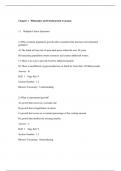Exam (elaborations)
[Introduction to Environmental Geology,Keller,5e] Test Bank: Your Study Companion
- Course
- Institution
- Book
The Test Bank for [Introduction to Environmental Geology,Keller,5e] is your ultimate ally for exam preparation. Offering practice exam questions based on official exams and providing detailed answers, it is designed to enhance your understanding and performance. Here's to acing your exams in !
[Show more]



